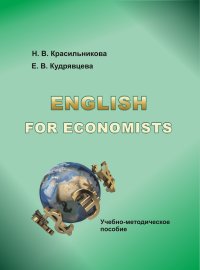English for economists
Покупка
Тематика:
Английский язык
Издательство:
Поволжский государственный технологический университет
Год издания: 2018
Кол-во страниц: 60
Дополнительно
Вид издания:
Учебно-методическая литература
Уровень образования:
ВО - Бакалавриат
ISBN: 978-5-8158-2028-9
Артикул: 779883.01.99
Представлены аутентичные тексты по экономической тематике, упражнения на усвоение профессионально ориентированной лексике и терминологии.
Для студентов направления бакалавриата 38.03.01 «Экономика» очной и заочной форм обучения.
Скопировать запись
Фрагмент текстового слоя документа размещен для индексирующих роботов
Н. В. Красильникова Е. В. Кудрявцева ENGLISH FOR ECONOMISTS Учебно-методическое пособие Йошкар-Ола 2018
УДК 811.111(075.8)
ББК 81.432.1я7
К 78
Рецензенты:
кандидат педагогических наук, доцент кафедры
иностранных языков и лингвистики ПГТУ Т. В. Голикова;
кандидат педагогических наук, доцент кафедры
иностранных языков и лингвистики ПГТУ Е. М. Егошина
Печатается по решению
редакционно-издательского совета ПГТУ
Красильникова, Н. В.
English for economists: учебно-методическое пособие /
Н. В. Красильникова, Е. В. Кудрявцева. – Йошкар-Ола: Поволжский
государственный технологический университет, 2018. – 60 с.
ISBN 978-5-8158-2028-9
Представлены аутентичные тексты по экономической тематике, упраж
нения на усвоение профессионально ориентированной лексике и терминологии.
Для студентов направления бакалавриата 38.03.01 «Экономика» очной
и заочной форм обучения.
УДК 811.111(075.8)
ББК 81.432.1я7
ISBN 978-5-8158-2028-9
© Красильникова Н. В.,
Кудрявцева Е. В., 2018
© Поволжский государственный
технологический университет, 2018
К 78
CONTENTS Предисловие ................................................................................................ 4 Text 1. ECONOMICS................................................................................... 5 Text 2. SUPPLY AND DEMAND ............................................................... 9 Text 3. MONEY ........................................................................................ 12 Text 4. HOW IS MONEY MEASURED AND CREATED? .................... 15 Text 5. TRADE .......................................................................................... 19 Text 6. INTERNATIONAL TRADE......................................................... 22 Text 7. TRADE SURPLUS AND DEFICIT ............................................. 25 Text 8. HOW DO EXCHANGE RATES FUNCTION?............................ 29 Text 9. GDP AND GNP ............................................................................ 31 Text 10. MARKET STRUCTURE ............................................................ 34 Text 11. TYPES OF BUSINESS ENTITIES ............................................. 38 Text 12. FINANCIAL INSTITUTIONS: BANKS .................................... 42 Text 13. TAXES ........................................................................................ 46 Text 14. ACCOUNTING ........................................................................... 50 Text 15. AUDIT ......................................................................................... 54 Список литературы .................................................................................. 58
ПРЕДИСЛОВИЕ Учебное пособие ориентировано на студентов направления подго товки «Экономика» очной и заочной форм обучения. Работа с аутентичными текстами по экономической тематике, вы полнение упражнений на усвоение профессионально ориентированной лексики и терминологии, подготовка краткого изложения прочитанного материала позволят студентам не только расширить словарный запас по предложенным темам, усовершенствовать навыки чтения, но и овладеть умением быстрого извлечения информации из текстов по специальности, а также научиться кратко и логически последованно передавать содержание прочитанной информации. Предложенные в пособии тексты взяты с сайтов сети Интернет, где раскрывается содержание экономических тем и проблем. Эти тексты представляют практический и познавательный интерес для студентов экономических направлений подготовки.
Text 1 E C O N O M I C S 1. Read the following international words and give their Russian equivalents: economics, recession, banking, finance, microeconomics, to analyze, capital, public, discipline, idea. 2. Read the following text and answer the questions: Economics can be defined in a few different ways: it’s the study of scarcity, the study of how people use resources, or the study of decisionmaking. Economics often involves topics like wealth, finance, recessions, and banking, leading to the misconception that economics is all about money and the stock market. Actually, it’s a much broader discipline that helps us understand historical trends, interpret today’s headlines, and make predictions for coming decades. One of the central ideas of economics is that people want certain things and will change their behaviour to get those things – in other words, people will respond to incentives. A good school district provides an incentive for parents to try to move to a neighbourhood if they want to ensure their kids get a good education. Lower wages in another country provide an incentive for a factory to relocate overseas to cut down on costs. High taxes provide an incentive for people to look for ways to hide their income because they want to keep more of their money. Economic study ranges from the very small to the very large. Microeconomics analyzes basic elements in the economy, including individual agents and markets, their interactions, and the outcomes of interactions. Individual agents may include, for example, households, firms, buyers, and sellers. Macroeconomics analyzes the entire economy (meaning aggregated production, consumption, savings, and investment) and issues affecting it, including unemployment of resources (labour, capital, and land),
inflation, economic growth, and the public policies that address these issues (monetary, fiscal, and other policies). Important public policy debates revolve around questions of economics. Governments all over the world employ economists to help understand how government health programmes will affect the incentives of doctors, whether farm subsidies will raise or lower prices at the grocery store, and the best ways to fight poverty. Much of economics involves using data gathered by governments, businesses, or in the laboratory to test hypotheses about whether a certain programme, event, or incentive will have the expected effect. Another branch of economics focuses on using economic theory to make predictions about how people and markets will behave. Thus, broad distinctions within economics include those between positive economics, describing «what is», and normative economics, advocating «what ought to be»; between economic theory and applied economics. 1. How can economics be defined and what topics does it cover? 2. What does microeconomics deal with? 3. What is the difference between microeconomics and macroeconomics? 4. How do economists test their theories? 5. What does economic theory help to predict? 3. Learn the following words and expressions: production производство stock market фондовый рынок, биржа consumption потребление resources ресурсы money деньги government правительство savings сбережения, накопления income доход


